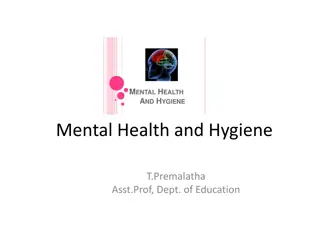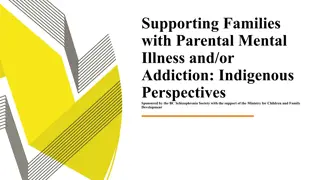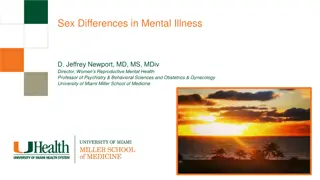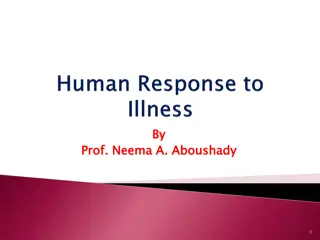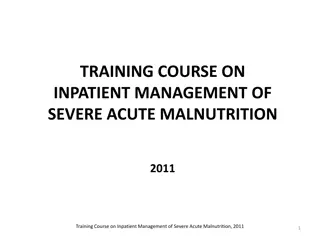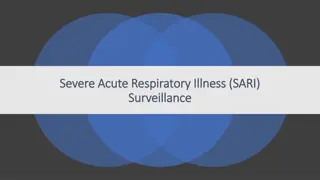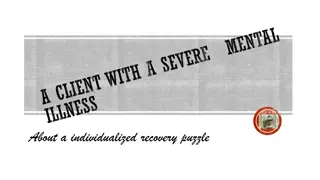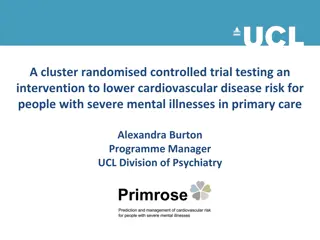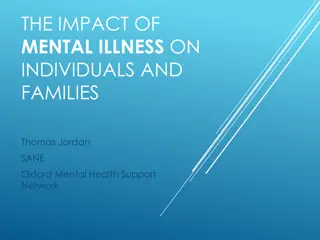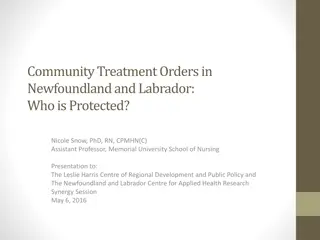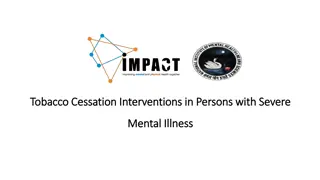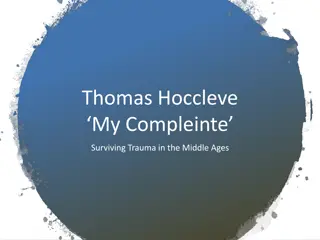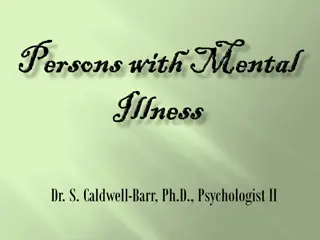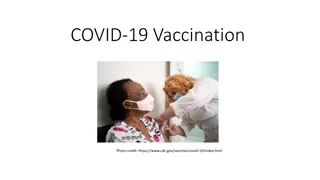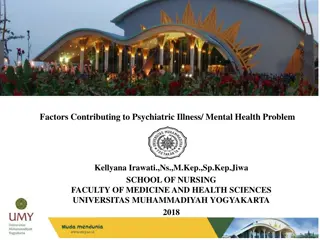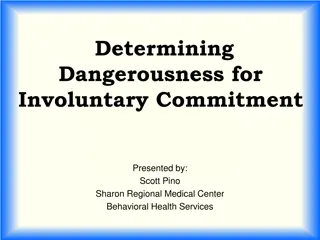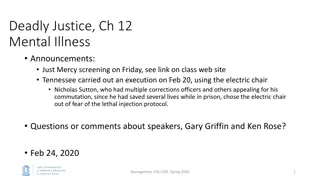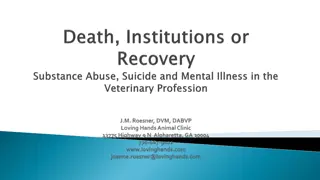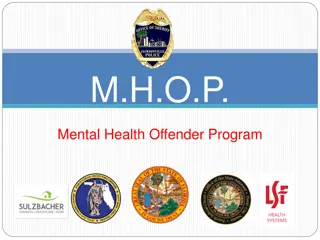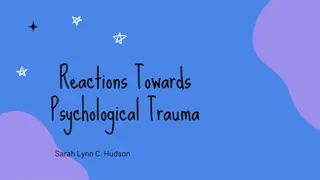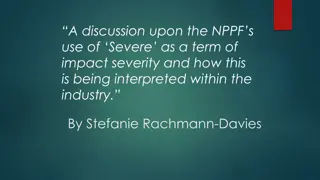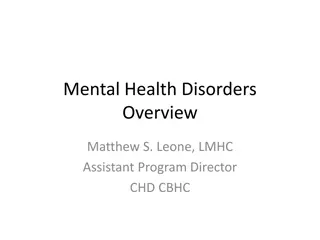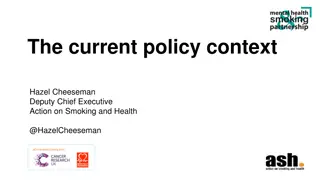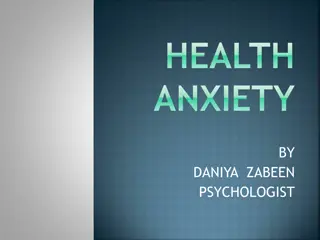Acknowledgement of Country
Acknowledging the impact of mental illness in legal settings, this content delves into identifying mental disorders, communicating effectively, and the importance of recognizing mental health issues. It highlights the prevalence of mental disorders in court-involved individuals, the criteria for men
3 views • 11 slides
The History of NAMI and the Family Movement
Founded in 1977 by two mothers seeking support for loved ones with mental illness, NAMI (National Alliance on Mental Illness) has grown to be a leading grassroots organization advocating for mental health awareness, support, and education. The Contra Costa chapter, NAMI CC, has a rich history of pro
1 views • 15 slides
Understanding Mental Health vs. Mental Illness
Explore the nuanced differences between mental health and mental illness, where mental health pertains to the quality of mental and emotional wellbeing for everyone, while mental illness refers to diagnosable conditions with long-term effects that do not affect everyone in the same way. Gain insight
9 views • 18 slides
Understanding Mental Health and Pandemics
This module delves into mental health terminology, the impact of pandemics on mental well-being, identifying mental distress, tools for prevention and response, and providing support during acute phases of mental health issues. Learners will gain knowledge on various concepts related to mental healt
0 views • 14 slides
Enhancing Mental Healthcare in Prisons: Integrating Care Programme Approach and Community Mental Health Framework
Planning effective mental healthcare in prisons involves utilizing the Care Programme Approach and the Community Mental Health Framework to address challenges in service delivery, ensuring continuity of care, and providing support for complex mental health needs in the prison population. The Communi
4 views • 27 slides
Understanding Mental Health and Hygiene: Key Characteristics and Definitions
Mental health, as defined by the World Health Organisation and Hadfield, emphasizes well-being, coping with life stresses, and contributing positively to society. Mental hygiene aims to prevent mental illness and maintain mental health. Key characteristics such as life satisfaction, resilience, soci
1 views • 25 slides
Law Enforcement's Response to Mental Health Crisis Intervention
Law enforcement agencies have established Emotionally Disturbed Persons Response Teams (EDPRT) and Crisis Intervention Teams (CIT) to address mental health crises in the community. These specially trained officers handle situations involving emotionally disturbed individuals, suicidal persons, psych
0 views • 13 slides
Understanding Mental Health in Tower Hamlets: Key Stats and Strategies
The Tower Hamlets JSNA report for February 2019 sheds light on the prevalence of mental health issues in the borough, highlighting statistics such as higher rates of mental health disorders compared to London. It emphasizes the importance of addressing wider determinants of mental health and the nee
1 views • 52 slides
Indigenous Perspectives on Supporting Families Facing Parental Mental Illness and Addiction
This event, hosted by the BC Schizophrenia Society with the support of the Ministry for Children and Family Development, focuses on supporting families dealing with parental mental illness and addiction from Indigenous perspectives. It includes discussions on strengthening mental health systems, com
0 views • 10 slides
The Long Term Plan in Mental Health Services: Key Ambitions and Achievements
Professor Tim Kendall, National Clinical Director for Mental Health, outlined key ambitions for mental health services in the NHS Long Term Plan by 2023/24. These include increased access to specialist perinatal mental health services, school-based support teams, and NICE-approved IAPT services. The
0 views • 9 slides
Understanding Sex Differences in Mental Illness and Its Impact
Exploring various aspects of mental health issues, this content sheds light on sex differences in depression, anxiety disorders, PTSD, and suicide rates. It discusses the age of onset for depression, the prevalence of anxiety disorders, and the challenges individuals face in dealing with mental illn
2 views • 10 slides
Nursing Strategies for Emotional Reactions to Illness
In this content, the focus is on understanding the stages of illness and the crucial role of nurses at each stage. It also highlights the patient's emotional needs during illness and the importance of maintaining a positive self-image. Nursing strategies for assisting patients in coping with anxiety
0 views • 8 slides
Managing Physical Health in Severe Mental Illness with a Focus on Diabetes
This educational material presents a comprehensive slide set designed to aid in the management of physical health in individuals with severe mental illness, focusing on diabetes. It includes insights on the challenges faced by healthcare professionals, learning objectives on diabetes management, and
0 views • 14 slides
Inpatient Management of Severe Acute Malnutrition Training Course 2011
This training course focuses on inpatient management of severe acute malnutrition, teaching procedures outlined in the national Community-Based Management of Severe Acute Malnutrition Guidelines. The training aims to reduce case fatality rates significantly and is designed for physicians, senior nur
0 views • 9 slides
Surveillance and Monitoring of Severe Acute Respiratory Illness (SARI) for COVID-19
Introduction to the surveillance of Severe Acute Respiratory Illness (SARI) with a focus on COVID-19 cases and clusters. The monitoring of hospitalized SARI cases, identification of unlinked cases, and implementation of control measures to reduce transmission are highlighted. Criteria for defining S
2 views • 11 slides
Innovative Approaches for Individualized Recovery in Severe Mental Illness
Embracing the recovery model for individuals with severe mental illness entails moving away from traditional approaches and focusing on values, shared decision-making, and community support. The hierarchy of needs profiles different levels of specialized services, while measurements include wellbein
0 views • 8 slides
Cluster Randomised Controlled Trial for Cardiovascular Disease Risk in Severe Mental Illness
A cluster randomised controlled trial is being conducted to test an intervention aimed at reducing cardiovascular disease risk for individuals with severe mental illnesses in primary care settings. Led by Professor David Osborn at UCL Division of Psychiatry, the study is funded by the National Insti
0 views • 21 slides
Understanding Severe Mental Illness in Mothers: Impacts and Support
Mothers with severe mental illnesses like Schizophrenia face unique challenges in parenting. Support from partners, family, and the community is crucial for their well-being. Despite the difficulties, with proper treatment and support, women with severe mental illnesses can effectively fulfill their
3 views • 23 slides
Impact of Severe Mental Illness, Physical Comorbidity, and COVID-19 in South Asia
The research funded by the National Institute for Health Research aims to address the mortality gap and health inequalities faced by individuals with severe mental illnesses in South Asia. The study focuses on improving outcomes for mental and physical multimorbidity, reducing depression and anxiety
0 views • 9 slides
Understanding Involuntary Commitment Criteria for Adults with Serious Mental Illness
Involuntary commitment for adults with serious mental illness is a sensitive issue that involves specific criteria to determine if someone poses a danger to themselves or others. The criteria include having a serious mental illness, being a threat to self or others, or having an inability to provide
0 views • 67 slides
Understanding the Impact of Mental Illness on Individuals and Families
This presentation delves into the profound impact of mental illness on individuals and families, exploring biological, genetic, chemical, and environmental factors that contribute to mental health struggles. It highlights societal pressures, traumatic experiences, and upbringing influences, shedding
0 views • 10 slides
Mental Health Legislation in Newfoundland and Labrador: A Study by Nicole Snow
This presentation by Nicole Snow explores mental illness, community treatment orders, and mental health legislation in Newfoundland and Labrador. It discusses the prevalence of mental health issues in Canada, the economic burden of mental illness, and the purpose of mental health legislation in prot
3 views • 38 slides
Tobacco Cessation Interventions in Severe Mental Illness
Individuals with severe mental illness face health and socioeconomic disparities, often compounded by tobacco use. Tobacco is a major contributor to global morbidity and mortality, disproportionately affecting low and middle-income countries. High tobacco prevalence is observed in people with SMI, n
0 views • 37 slides
Understanding Thomas Hoccleve: Surviving Trauma and Mental Health in the Middle Ages
Thomas Hoccleve, a scribe and clerk, dedicated works to future Henry V but faced a gap in records possibly due to mental illness. His series explores personal struggles and recovery. Scholars debate his depiction of mental illness and raw honesty in his works, drawing parallels to Chaucer. Hoccleve'
0 views • 18 slides
Understanding the Impact of Tobacco Use on People with Serious Mental Illness
People with serious mental illness are significantly affected by tobacco use, with smoking being a leading preventable cause of early death in this population. This presentation highlights the reasons behind smoking in individuals with mental illness, challenges faced in cessation efforts, and the i
0 views • 12 slides
Understanding Mental Illness and Disability Rights
This content provides insights into commonly held attitudes and beliefs about mental illness, the American with Disabilities Act of 1990, definitions of mental illness per NRS 433A.115, and interactions with individuals with mental health issues. It also covers misconceptions, the 72-hour hold for m
0 views • 60 slides
Ending the Silence: Mental Health Programs for Schools
NAMI of Southwest Ohio, an affiliate of the National Alliance on Mental Illness, provides educational classes, support groups, and NAMI Signature Programs to schools and communities in the region. One of their signature programs, "Ending the Silence," aims to increase help-seeking behaviors among yo
0 views • 10 slides
Understanding COVID-19 Vaccination: Importance, Types, and Effectiveness
COVID-19 vaccination is crucial in reducing the likelihood of infection, severe illness, and spread of the virus. Almost everyone over 6 months should get vaccinated, except those with severe allergies to vaccine components. The Pfizer-BioNTech, Moderna, and Novavax vaccines are safe and effective.
0 views • 14 slides
Factors Contributing to Psychiatric Illness and Mental Health Issues
Factors contributing to psychiatric illness and mental health problems include predisposing factors such as psychological and biological factors, as well as precipitating stressors like challenging stimuli. Mental health is defined as a state of well-being involving happiness, contentment, and effec
0 views • 15 slides
Understanding Mental Health Procedures for Involuntary Commitment
The Mental Health Procedures Act, enacted in 1976 and amended in 1978, provides guidelines for the treatment of individuals with mental illness, emphasizing voluntary treatment over involuntary. It outlines criteria, such as evidence of severe mental illness and dangerous behavior, for pursuing invo
0 views • 32 slides
Understanding Legal Ramifications of Mental Illness in Criminal Justice System
Mental illness presents complex challenges in the criminal justice system, impacting court rulings, constitutional issues, and perceptions of vulnerability. Cases like James Holmes and John Hinckley highlight the intersection of mental health and criminal behavior. Legal standards regarding executio
0 views • 9 slides
Understanding the Intersection of Addiction and Mental Illness in Veterinarians
Explore the profound impact of addiction and mental illness on veterinarians, highlighting the biological and environmental components, the prevalence of serious mental illness, the challenges in seeking mental health help, and the heightened risk of suicide within the veterinary profession. Promote
0 views • 28 slides
Severe Weather Project Summary for Week 34
Week 34 of the Severe Weather Project focused on expanding development and evaluation of severe weather potential model guidance. The project aimed to develop experimental forecast tools for severe weather at Week 3-4 time range, utilizing a hybrid model and SCP (Supercell Composite Parameter). The
0 views • 21 slides
Mental Health Offender Program: Addressing Mental Illness in the Criminal Justice System
A pilot program, M.H.O.P., aims to reduce the burden on the criminal justice system by providing pretrial release, personalized care plans, and court supervision for defendants with mental illness. By addressing the needs of the mentally ill, the program strives to break the cycle of criminal behavi
0 views • 21 slides
Exploring Mental Health through Literature: The Catcher in The Rye Unit
In this unit, students delve into the theme of mental illness through J.D. Salinger's "The Catcher in The Rye". The focus is on understanding signs of mental disorders, de-stigmatizing mental illness, and promoting social support. Activities include reading, reflective writing, and group discussions
0 views • 14 slides
Interpreting the Use of 'Severe' in NPPF Impact Assessment
Understanding the term 'severe' in the National Planning Policy Framework (NPPF) for impact severity and its implications within the industry. The NPPF guidelines emphasize the importance of addressing significant impacts on the transport network and distinguishing between severe and significant imp
0 views • 14 slides
Understanding Mental Health Disorders and Their Impact
Mental health disorders are prevalent, affecting 1 in 5 adults in the U.S. each year. They can significantly impair various aspects of life and lead to severe consequences, including high costs, hospitalizations, homelessness, and incarceration. Factors contributing to mental illness vary from biolo
0 views • 54 slides
Addressing Smoking Disparities in Mental Health Populations
Hazel Cheeseman, Deputy Chief Executive of Action on Smoking and Health (ASH), outlines key concerns about smoking inequalities in individuals with severe mental illness (SMI) and those with common mental health conditions. ASH's call to action includes raising awareness of the smoking-mental health
1 views • 8 slides
Severe Weather Executive Briefing - El Paso County - Pikes Peak Region
Severe weather events in the Pikes Peak region of El Paso County from June 8th to June 23rd, 2023, led to significant damages and emergency response activities. The area experienced above-average precipitation levels, severe thunderstorms, floods, and tornadoes, resulting in extensive damages to inf
0 views • 9 slides
Understanding Health Anxiety: Causes, Symptoms, and Impacts
Health anxiety, also known as illness anxiety or hypochondria, is characterized by obsessive worry about having a serious medical condition. Individuals with health anxiety misinterpret minor body sensations as symptoms of a severe illness, despite reassurance from medical professionals. This condit
0 views • 16 slides





